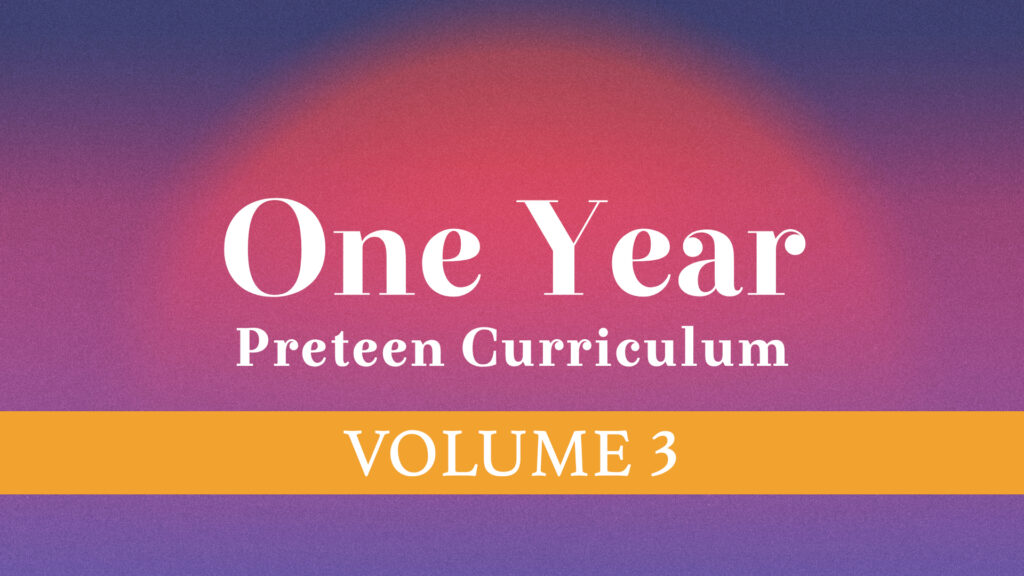PRETEEN LESSON ON ANGER

Preteens are full of emotions and when they can’t express how they feel they can become frustrated.
As leaders, we have the opportunity to help our them understand how to handle those frustrations in a healthy way.
Use this lesson to teach preteens that how they respond to anger is what matters.
– Nick Diliberto
Looking for preteen ministry curriculum? Check out the…
ONE YEAR PRETEEN CURRICULUM, VOLUME 3 – Get one year of new preteen ministry curriculum designed to help 4th-6th graders explore their faith and wholeheartedly follow Jesus.

PRETEEN LESSON ON ANGER
Written by Stef Litzler
Bible: Jonah 4:5-11; Ephesians 4:26 and James 1:19
Bottom Line: How we respond in our anger is what matters.
SUPPLIES
- Balloons (one per student)
- List of “anger scenarios”
OPENING GAME: A PUFF OF ANGER
GAME PREP
Before the lesson, prepare a list of “anger scenarios.”
Scenarios may include those listed below or others that are similar.
Take some time to ask preteens what makes them angry before the lesson and add those to the list provided.
ANGER SCENARIOS
- Your family was late to school and you received a tardy because of your siblings.
- Your teacher put questions on a test that she did not put on the review.
- During recess, your friends decided they didn’t want to hang out with you because they wanted to impress the new, popular kid.
- You really wanted cake at your friend’s birthday party, but there wasn’t enough for you when it was your turn.
- You want to tell you parents something but your siblings won’t be quiet long enough for you to speak.
- You think one of your siblings messed with your things.
- One of your classmates at school is acting like he/she is better than you.
- Your parents are letting your brother and sister stay up later but they tell you that you have to go to bed.
- Your teacher is favoring a student that you think is acting like a teacher’s pet.
- Being told “NO” when you want to go somewhere or do something.
- You were supposed to go to your friend’s house to spend the night, but you got sick and have to stay home.
- Your family planned a fun vacation to the beach that you had to cancel because of the weather.
- You are trying to tell your parents something and you think they are listening, but they ask you to repeat the story after you’ve already told the whole thing.
- You share a bathroom with your brother or sister and they take forever getting ready in the morning and you need to get into the bathroom.
- You want to go to a concert with your friends, but your parents won’t let you because they are worried about you being out too late on a school night.
HOW TO PLAY THE GAME
Say: Today, we are playing a game called “A Puff of Anger”.
I am going to give every student a balloon.
Then I will read of different scenarios.
When you hear the scenarios, I want you to decide how angry that situation makes you feel.
If the situation makes you a little angry, blow into your balloon one time.
If the situation makes you more than a little angry, blow into your balloon two times.
If the situation makes you EXTREMELY angry, blow into your balloon three times.
If we have enough scenarios, we’ll play until everyone’s balloons pop.
If we don’t have any scenarios left, we’ll just stop our balloons where they are and tie them off.
Optional: You could have every student think of what makes them most angry and have them “release” that answer by popping their balloon.
TEACH
Say: Today we played a game where we measured our anger based upon different situations.
In some of the situations we encountered, anger was a result of a feeling of things that were unfair or a result of unmet expectations.
We’re going to look at someone in the Bible who was angry because he expected one thing, but experienced another.
Read Jonah 4:5-11.
Jonah had gone out and sat down at a place east of the city.
There he made himself a shelter, sat in its shade and waited to see what would happen to the city.
Then the Lord God provided a leafy plant and made it grow up over Jonah to give shade for his head to ease his discomfort, and Jonah was very happy about the plant.
But at dawn the next day God provided a worm, which chewed the plant so that it withered. When the sun rose, God provided a scorching east wind, and the sun blazed on Jonah’s head so that he grew faint.
He wanted to die, and said, “It would be better for me to die than to live.” But God said to Jonah, “Is it right for you to be angry about the plant?”
“It is,” he said. “And I’m so angry I wish I were dead.” But the Lord said, “You have been concerned about this plant, though you did not tend it or make it grow. It sprang up overnight and died overnight.
And should I not have concern for the great city of Nineveh, in which there are more than a hundred and twenty thousand people who cannot tell their right hand from their left—and also many animals?”
Say: This seems like a strange story, but you have to understand what God was trying to teach Jonah.
Jonah was already angry that God was going to show grace and compassion toward the people of Ninevah who had been sinful and rebellious toward God.
God asked Jonah if it was right for Jonah to be angry about God’s compassion toward the Ninevites.
God wanted Jonah to think about why he was angry, so God used a plant to teach him a lesson.
In the heat of the son, this plant provided shade for Jonah.
Jonah did nothing to deserve the plant or to help the plant grow and prosper.
Jonah did nothing to deserve the plant.
He enjoyed the comfort of its shade and its protection.
He came to expect it to be there for him.
This plant was a generous gift from God that Jonah did not deserve.
When the plant died and Jonah no longer had shade, Jonah became angry.
Jonah did not think it was fair that a rebellious group of people be shown grace and compassion.
God helped Jonah understand that no one deserves His grace and compassion.
God has concern for those who are lost.
God has concern for those who follow Him.
God has concern for people because He is a loving God.
God has concern for people because He is the Creator.
Many times, we are angry like Jonah and we are so focused on what we think is fair.
We want others to receive punishments they deserve.
Ask: Do any of you ever get frustrated when your friends are disobedient and don’t receive the punishment you think they deserve?
Allow a few responses from students.
Ask: What about your siblings? Has there been a time when you thought your sibling deserved a harsher punishment?
And why do you think this bothers us?
Allow for responses.
When you get in trouble, are you grateful when you are shown forgiveness and grace and receive a lesser punishment?
Just like Jonah began to expect the protection of the plant, we expect things for ourselves that we didn’t earn or things that are not promised to us.
During our game earlier, there were many reasons for anger.
Sometimes we get angry because we are frustrated.
Sometimes we get angry because we are hurting.
Sometimes we get angry because we are fearful.
Sometimes we get angry because we let things that make us upset pile up until we reach the point of anger.
Most of the scenarios we mentioned during the game had to do with selfishness and entitlement.
When our desires are not met, we can get angry.
When things don’t go the way we want them to, we can get angry.
When others frustrate or hurt us, we can get angry.
When people blame us, we can get angry.
We will get frustrated.
We will experience pain.
We will feel overwhelmed.
We will feel judged.
We will encounter things that are not fair.
We will not get what we want.
But what will we do when we get angry?
God asked Jonah, “Is it right for you to be angry about the plant?”
Maybe this is a question we should always ask when we get angry.
Is our anger okay in the first place?
And if you do have a right to be angry, how should you respond or react in that anger?
Ephesians 4:26 says, “In your anger, do not sin.”
James 1:19 says, “My dear brothers and sisters, take note of this: Everyone should be quick to listen, slow to speak and slow to become angry, because human anger does not produce the righteousness that God desires.”
God recognizes that we will get angry.
But, like He did with Jonah, God wants us to check our anger.
How we respond in our anger is what matters.
Do we huff and puff and reach an exploding point?
Do we release our hot air?
Do we take matters into our own hands?
Do we ask for help?
Do we consider others before ourselves?
Do we allow our selfishness to direct our heart and our actions.
Jonah became angry and unforgiving because he allowed his anger to control him.
Let’s allow God to check our heart and help us process our anger.
He can handle our anger and wants us to keep from sinning in the midst of our anger.
Let’s pray together now and ask Him to help us with our anger.
Close in prayer.
SMALL GROUP DISCUSSION QUESTIONS
1. Is being angry a sin? Why or why not?
2. Why do you think God questioned Jonah’s anger in Jonah 4?
3. What are some ways that each of you deal with anger?
4. Can you think of any stories or scriptures in the Bible that could help us with our anger?
5. Do you think Jonah sinned in his anger? Why or why not?
6. How can you help others control their anger?
7. Have you noticed a time when you are consistently getting angry? How can you change your response or your attitude to help you with this situation?
[End discussion questions.]
Looking for preteen ministry curriculum? Check out the…
ONE YEAR PRETEEN CURRICULUM, VOLUME 3 – Get one year of new preteen ministry curriculum designed to help 4th-6th graders explore their faith and wholeheartedly follow Jesus.


One Reply to “PRETEEN LESSON ON ANGER”
Memoir chimwamurombe
Powerful lesson on anger